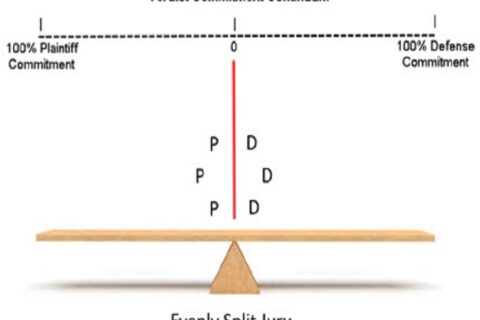Don’t Let Docs Testify Afraid of Their Own Shadow

Demonstrations of Exemplar Testimony Calms the Nerves and Boosts Performance

HUMAN TRIALS The Litigation Psychology Blog
Litigation and Clinical Psychologist, Adam Rosen, J.D., Ph.D., shares insights on jury psychology and winning in court from his witness consulting and mock trials in more than 400 cases over 25 years.
Testifying as a defendant doctor can be a harrowing experience under even the best of circumstances. But ascending to the witness chair without having actually seen capable responses to difficult and provocative questions is a recipe for unnecessary angst and underperformance. Particularly when facing a worthy adversary armed with many rhetorical ploys and emotional appeals, it is essential that a defendant witness has actually seen how to manage these challenges to ensure that a fair and accurate depiction of their care is put forward – and endures.
“See One, Do One…” If it’s Good Enough for Surgery, it’s Good Enough for Testimony
Traditional steps in preparing defendant physicians for deposition or trial testimony include reviewing the medical record and discussing lines of questioning that may appear during an upcoming deposition or trial. In more recent years, the advent of video technology has added the somewhat helpful practice of conducting a mock exam of the doctor, which may then be reviewed and critiqued, offering ideas for improvement.
But a doctor watching their own fledgling and faltering testimonial skills is true of limited utility, particularly when compared to watching an exemplar of excellent testimony, which can be reviewed, emulated, and internalized.
In fact, the practice of observing a capable practitioner before proceeding on one’s own is well established in the physician witness’ prior medical training. The famous “See One, Do One, Teach One” rule has a long and revered history in medical education (https://www.ncbi.nlm.nih.gov/pmc/articles/PMC4785880). This adage, and the practice it refers to, recognizes the unequalled role that observation of capable performance plays in learning a complex task before presuming to do it oneself. The enduring legacy of this idea – and this practice – is a testament to the unparalleled efficacy of observational learning, When one compares the readiness of a doctor who has seen exemplar testimony to one who has not been prepared this way, the differences in skill and efficacy are striking – and often highly consequential.
How Bad Can It Be if They Just Tell the Truth?
Anyone taking an oath, to tell the truth, experiences an appropriately amplified focus on the simple facts as they know them, which is only right. But where that focus eclipses recognition of the stealthful tactics that will be used against them, their answers can end up serving the intentions of a guileful questioner instead of the truth. Experienced trial counsel knows about the explicit and implicit messages woven into skilled cross-examination questions, as well as the effect of naive or unqualified agreement with these ideas. And not having seen these tactics in a wide array of circumstances, the unskilled defendant doctor is typically unaware of these tactics, cannot recognize them in real time, and falls for the traps all too readily.
As an example, observe the following questions, the implied criticisms, and how the poorly prepared unskilled witness, though answering truthfully, fails to recognize and resist the tacit criticisms and consequently leaves those criticisms untouched and intact. It is just these types of acquiescent responses, endorsing the plaintiff’s theme of negligence, that can end up in large print in the front of the jury.
Q: Doctor, Isn’t It True That With Your Admitting Privileges, You Could Have Put Mr. Thompson in the Hospital Overnight Instead of Sending Him Home?
A: Yes.
Q: But You Didn’t Do That, Did You? You Sent Him Home, Where He Died, Correct?
A: That’s correct.
Q: And if You Had Not Sent Him Home, He Would Have In Fact Been in the Hospital at 5:42 am, Which Is When He Had His Cardiac Arrest, Correct?
A: He would have been in the hospital, yes.
The doctor’s apprehension and his narrowed focus on just what is “the truth,” causes him to not recognize the errant messaging he is being led to endorse. The doctor’s answers here represent honest replies to the overt questions, but they leave powerful implicit criticism (e.g. “if you could have admitted the patient to the hospital then you should have.”) entirely unaddressed and unchallenged
Pre-testimonial meetings where this line of prospective questioning is discussed are of course useful. And putting the doctor himself through some of these questions can also generate some of the caveats and clarifications the doctor could appropriately assert when questioned. But given how wide the assortment of these attacks can be and the importance of handling each one of them with sufficient precision and force, a more comprehensive thorough, and true-to-life demonstration of the content, pace, and energy of such questions – managed by an aware and capable responder – has no equal among the more traditional options.
Here is what the above testimony might look like when performed by an aware and able exemplar witness. These more effective responses by the mock witness should be recorded for subsequent review by the doctor, subject, as always, to the doctor’s revision of medical concepts as needed.
Q: Doctor, Isn’t It True That With Your Admitting Privileges, You Could Have Put Mr. Thompson in the Hospital Overnight Instead of Sending Him Home?
A: I can admit IF it is needed.
Q: But You Didn’t Do That, Did You? You Sent Him Home, Where He Died, Correct?
A: Yes, after two EKGs and an x-ray came back negative, admission was not deemed appropriate.
Q: And if You Had Not Sent Him Home, He Would Have In Fact Been in the Hospital at 5:42 am, Which Is When He Had His Cardiac Arrest, Correct?
A: IF I had admitted him, yes. But that was not appropriate given the workup.
Each one of the above responses manifests a fairly similar testimonial principle, that of answering the literal question, but adding appropriate qualifiers that diffuse the implicit criticism hidden in the question. We can tell doctors they can and should do this and we can discuss a half dozen examples of it and see how they do in a practice examination. But the instances in which this type of skill is necessary are so much more abundant and varied than these few examples that only a more extensive and thorough collection of questions and answers – demonstrated by a capable witness surrogate (and recorded for review) can afford the doctor the sufficient ability to view, study and review this essential and highly consequential skill in the many areas it will arise during actual testimony.
But Who Can Demonstrate?
Any experienced trial team has a lead or second chair partner, even an experienced associate, who has seen enough testimony to know the basic cadence and tactics of a focused and rigorous examination. These experienced litigators – or a witness consultant – can readily draft a ten or so page Q and A document based upon the medical record and discussions with the doctor about the clinical situation, diagnoses, care decisions, and procedures. Although this role play may represent a new and different stance for counsel, the yield for the client and their defense is well worth it. And of course, where counsel already has umpteen tasks to prepare for during discovery or an impending trial, this exercise can be effectively farmed out to a colleague or a skilled witness preparation expert. In my experience, my performance as the witness in these exemplar demonstration sessions often yields not only immeasurable gains for the testifying physician but also often new vistas on trial themes and arguments.
But Doesn’t Only the Doctor Know the Medicine?
The defendant doctor is of course always the last word on the medicine and her or his knowledge and reasoning must be plumbed and deferred to in determining medically accurate and truthful responses. But after this review of the medical care and decisionmaking, counsel or consultant can draft a set of representative questions, inserting the doctor’s substantive replies, but with a brevity and punch that an unskilled witness would not achieve on their own. This document serves as the basis for the essential mock examination – but with counsel or consultant in the role of witness – a performance that has no match in the prior discussions or practice sessions. This mock exam is ideally recorded so the doctor can master the skills depicted not just during that one hour, but upon subsequent review and study of the tape.
Consider just some of the most simple form responses, which demonstrate witness control during their testimony and which briefly but importantly resist distortions and over-generalizations by opposing counsel:
“Yes, if it was indicated.”
“Possible, but quite unlikely.”
“It depends on the clinical presentation.”
“No, because there was no sign of that at the time.”
None of these are magical or mystical words, but knowing when to employ them and with what tone, force, and substantive backup is a skill that just does not come naturally to very many people, including highly educated healthcare providers.
It’s Never Wrong to Arm the Client with the Most Powerful Tools Available
Adam Rosen, J.D., Ph.D. is an Attorney and Clinical Psychologist in Cambridge, Massachusetts. He provides witness preparation consultations nationwide, with a particular specialty in professional negligence cases. He is available for both in-office training sessions and virtually via Skype or Zoom. Contact: arosen@juryassociates.com Direct: 617-921-0332

